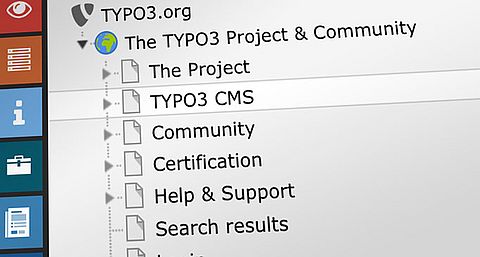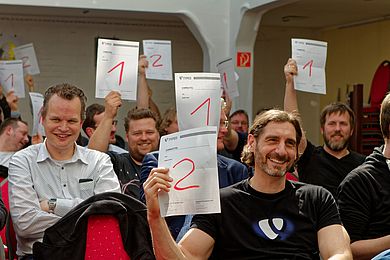The organizational structure of the TYPO3 Association isn't a proper fit anymore to the TYPO3 project's own internal structure, nor does it fit the size the project has become over time. A need for more democracy, a better separation of tasks and responsibilities and a transparent overall structure form the main motivation behind a radical change.
The TYPO3 Association is a tax-exempt association established in Switzerland in 2005. It's purpose is to collect membership contributions and donations for the long term development of TYPO3. From the beginning its structure was aimed at providing a central hub from which to support active developers as well as to concentrate its members into a pool of regular contributors. This structure has become obsolete with the steady growth of the Association. Over the past year a number of members took it upon themselves to formulate a proposal which, under the somewhat ironic moniker "Perestroika", should provide the TYPO3 Association with a new structure and operating procedures.
The origins of the TYPO3 Association
Originally the TYPO3 Association was aimed at allowing Kasper Skårhøj and a small circle of developers around him to concentrate fully on the development of TYPO3. The projects each of them needed to work on for customers to provide their necessary income had hardly left any time for them to make any improvements to the system as a whole. On the other hand features had crept into the core of the system, at the request of customers, that weren't necessarily useful to the community as a whole.
The TYPO3 Association was founded in order to raise funds for the further development of TYPO3. Even though the Association saw (and still sees!) its members as contributers, the members don't have any democratic means to determine how their contributions should be applied. This structure was initially chosen to keep the Association as simple and transparent as possible. The responsibility for budget decisions rested with a number of members who made up the Steering Committee and the Board, who joined the original founders of the Association (a Swiss 'Verein' by law). Among these people were Kasper Skårhøj, Robert Lemke, Dominic Brander, Adrian Zimmermann and a few others. This circle, while it did occasionally elect new members into its ranks, remained constant at around 12 members. The Board itself never had much formal power over the Association's means or other important subjects. It only concerned itself with accounting, communications with the media, promotional activities and it communicated with Association members.
In the future the Board will be elected indirectly by all members. The election will take place on-line to make sure everyone is able to participate.
Over the past years the number of TYPO3 Association members grew into the hunderds and the yearly budget is all but touching the 500.000 Euro boundary. These facts, as well as a few unclear legal and operational matters that cropped up during the last review of the Association's bylaws, necessitated a reworking of the Association's internal structure. It was clear to all involved that the Association should continue along the path towards more formal influence and authority for all members. A path already chosen with the establishment of the Business Control Committee (BCC) in February of 2010.
The road towards more democracy
The core of the new bylaws is aimed at providing all members with a right to vote for both of the central controlling bodies. The Expert Advisory Board (EAB) was added as a means to counterbalance the BCC. The relation between the two is similar to that between management and a supervisory board. The first concerns itself with how budget will be applied towards the direction as determined by the funded projects, while the latter checks whether the investment of funds was done properly and actually leads to the expected results.
Responsibilities within the TYPO3 Association
All members
- Elect the Expert Advisory Board and the Business Control Committee
- Vote on budget applications for the next fiscal year
The Expert Advisory Board
- Consists of six members who serve two-year terms; three of the six members will be elected each year.
- Distributes and manages the yearly budget on the basis of the survey results
- Elects the Board
The Board
- Consists of six members who serve two-year terms; three of the six members will be elected each year.
- Organizes procedures surrounding budget applications and the survey among the members.
- Runs the daily affairs of the Association as described in "Job Descriptions"
The Business Control Committee
- The BCC consists of four members who each serve a two-year term; two members get elected each year.
- Checks the books of the Association, especially concerning the application of funds by project leaders
A second goal of the restructuring was to give the members influence over budget decisions while at the same time making the assignment of budget to applicants (generally core developers) as efficient as possible. On the one hand it's impractical to have hundreds of members negotiate with around 20 applicants and attempt to reach an agreement. On the other hand we wouldn't have achieved much democracy if the Expert Advisory Board could decide over budget allication autocratically.
The timeline of the new budget process is based around the dates of the TYPO3 Conference T3CON and the annual General Assembly of the TYPO3 Association, which is usually held in February.
The new structure also provides new proceedings to establish the annual budget, which starts with a survey among Association members to evaluate all applications for budget. The Expert Advisory Board must use the results of this survey as its guide. In practice this means that the assignment of the yearly budget follows the result of the survey as accurately as possible, except where it considers areas such as accounting, legal matters, auditing etc.
Another function of the Expert Advisory Board is to elect the Association's Board in order to ensure the smoothest possible cooperation with the body which conduncts the Association's daily affairs. To prevent conflicts of interest, budget applicants can never be members of any Association body. It's also not possible to be a member of more than one Association body at the same time. Lastly, only a single person belonging to any one company is allowed to be a member of any single Association body. In this way the TYPO3 Association hopes to achieve the broadest possible representation from the community within its official bodies, while at the same time preventing any kind of concentration of influence with any one party.
Introduction of the new structure
After the Kanton of Zug checks and releases the new bylaws (a legal formality required for all associations) they will come into effect after the next General Assembly in February 2012. This will be the time at which the members of the TYPO3 Association elect the first Expert Advisory Board. The existing Steering Committee will dissolve itself at that point. Because the members of the Expert Advisory Board are elected for two-year terms, half of them will need to be elected for a single year.
During the months following the General Assembly the Expert Advisory Board will have time to get to grips with the administrative affairs of the Association as well as all running projects. In time for T3CON the Expert Advisory Board must put out a call for buget applications, check and publish all applications it receives and organize the members' vote on them.
After the vote the Expert Advisory Board will have until the end of the year to negotiate the budget with the applicants, which they will then submit as a proposal at the next General Assembly in February of 2013.
Until that time there'll be lots of work to be done in all areas of the TYPO3 Association. All those involved will be doing what they can to shape this small and peaceful revolution into a success for the TYPO3 project. All members are hereby invited to get involved. After all we still need to find the experts to evalute the contents of the project applications. Maybe one of them is even reading this article right now?
Thank you Roland Schenke and Bas van der Wiel for translating the original German article the English. Thanks to <link http: t3n.de _blank>T3N for letting us use <link http: t3n.de magazin demokratie-wagen-227998 _blank>the article.




